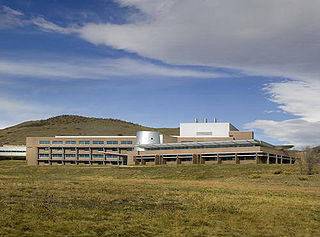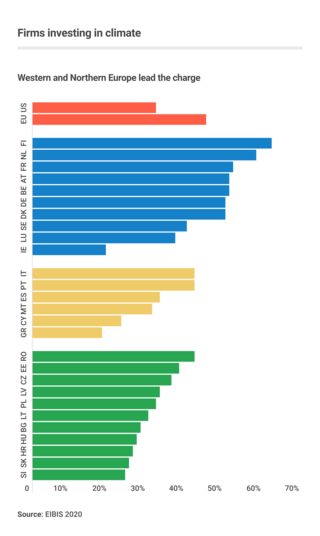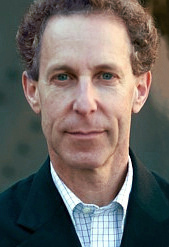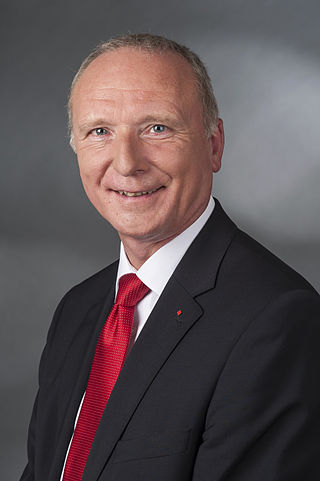
The National Renewable Energy Laboratory (NREL) in the US specializes in the research and development of renewable energy, energy efficiency, energy systems integration, and sustainable transportation. NREL is a federally funded research and development center sponsored by the Department of Energy and operated by the Alliance for Sustainable Energy, a joint venture between MRIGlobal and Battelle. Located in Golden, Colorado, NREL is home to the National Center for Photovoltaics, the National Bioenergy Center, and the National Wind Technology Center.

Business action on climate change includes a range of activities relating to climate change, and to influencing political decisions on climate change-related regulation, such as the Kyoto Protocol. Major multinationals have played and to some extent continue to play a significant role in the politics of climate change, especially in the United States, through lobbying of government and funding of climate change deniers. Business also plays a key role in the mitigation of climate change, through decisions to invest in researching and implementing new energy technologies and energy efficiency measures.

The Solar Electric Light Fund (SELF) is a non-profit organization whose mission is to design, fund and implement solar energy solutions to benefit those in poor rural communities without access to an electrical grid. This allows students to study at night and brings computers and Internet into schools. It makes it possible to bring in water for irrigation without having to hand-carry it long distances, allowing women to spend their time on money-earning enterprises. Access to electricity and water improves health care. SELF has completed several projects in more than 20 countries including a solar powered drip irrigation in Benin, a health care centre in Haiti, telemedicine in the Amazon rainforest, online learning platform in South Africa, and a microenterprise development in Nigeria.

The Kearl Oil Sands Project is an oil sands mine in the Athabasca Oil Sands region at the Kearl Lake area, about 70 kilometres (43 mi) north of Fort McMurray in Alberta, Canada that is operated by the 143-year old Calgary, Alberta-headquartered Imperial Oil Limited—one of the largest integrated oil companies in Canada. Kearl is owned by Imperial Oil and is controlled by Imperial's parent company, ExxonMobil—an American multinational that is one of the largest in the world.
Myles W. Scoggins was the 16th president of the Colorado School of Mines. He was appointed to the position in June 2006.
Founded in 2001, the American Council on Renewable Energy (ACORE) is a member-based, 501(c)(3) national non-profit organization that unites finance, policy and technology to accelerate the transition to a renewable energy economy.

According to data from the US Energy Information Administration, renewable energy accounted for 8.4% of total primary energy production and 21% of total utility-scale electricity generation in the United States in 2022.

ExxonMobil Corporation is an American multinational oil and gas corporation and the largest direct descendant of John D. Rockefeller's Standard Oil. The company, which took its present name in 1999 per the merger of Exxon and Mobil, is vertically integrated across the entire oil and gas industry, and within it is also a chemicals division which produces plastic, synthetic rubber, and other chemical products. ExxonMobil is headquartered near the Houston suburb of Spring, Texas, though officially incorporated in the U.S. state of New Jersey.
REMP, or Renewable Energy Mitigation Program, is a model of promoting renewable energy through local government building codes that was launched in Colorado in 2000.

Dan William Reicher is an American lawyer who was U.S. Assistant Secretary of Energy for Energy Efficiency and Renewable Energy at the U.S. Department of Energy (DOE) in the Clinton Administration. Reicher is currently executive director of the Steyer-Taylor Center for Energy Policy and Finance at Stanford University, a joint center of the Stanford Graduate School of Business and Stanford Law School, where he also holds faculty positions. Reicher joined Stanford in 2011 from Google, where he served since 2007 as Director of Climate Change and Energy Initiatives for the company's venture Google.org.

Walter R. Arnheim is an American oil company executive and former director of the Washington National Opera. He is currently a renewable energy specialist, private equity manager, and an adviser to companies and non-profit organizations.

The Interstate Renewable Energy Council (IREC), established in 1982, is a non-profit organization working with clean energy. It is based in Latham, New York.

In 2019, the total energy production in Indonesia is 450.79 Mtoe, with a total primary energy supply is 231.14 Mtoe and electricity final consumption is 263.32 TWh. Energy use in Indonesia has been long dominated by fossil resources. Once a major oil exporter in the world and joined OPEC in 1962, the country has since become a net oil importer despite still joined OPEC until 2016, making it the only net oil importer member in the organization. Indonesia is also the fourth-largest biggest coal producer and one of the biggest coal exporter in the world, with 24,910 million tons of proven coal reserves as of 2016, making it the 11th country with the most coal reserves in the world. In addition, Indonesia has abundant renewable energy potential, reaching almost 417,8 gigawatt (GW) which consisted of solar, wind, hydro, geothermal energy, ocean current, and bioenergy, although only 2,5% have been utilized. Furthermore, Indonesia along with Malaysia, have two-thirds of ASEAN's gas reserves with total annual gas production of more than 200 billion cubic meters in 2016.
James Eugene Rogers Jr. was an American businessman and author. He was president and CEO of Duke Energy, the largest electrical utility in the U.S., from April, 2006 until July 1, 2013. He stayed on as Chairman of the Board until retiring the following December. His book, Lighting the World, which explores the issues involved in bringing electricity to over 1.2 billion people on earth who lack it, was published August 25, 2015, by St. Martin's Press. The book asserts that access to electricity should be recognized as a basic human right.

EurObserv'ER is a consortium dedicated to the monitoring of the development of the various sectors of renewable energies in the European Union.

Thomas H. Stoner Jr. is lead director and a co-founder, along with Nobel laureate David Schimel of the Jet Propulsion Lab (NASA) and other leading climate experts, of Entelligent, a global provider of Smart Climate indexes, predictive equity portfolio analytics and advanced data on climate risk and climate transition. He served as CEO of Entelligent from 2017 to October 2023. Prior to Entelligent, Stoner founded Project Butterfly, a research organization that advocates primarily for the global capital markets as a solution to climate change. The research produced by Project Butterfly led to the creation of Entelligent and ultimately yielded two climate risk patents issued by the USPTO. Stoner is also the author of the 2013 book, "Small Change, Big Gains: Reflections of an Energy Entrepreneur," which includes research about transforming the global energy supply to be more reliant on sustainable fuel sources by the end of the century. Stoner has been a promoter of sustainable development for over 30 years, having built, financed and owned and operated renewable energy projects throughout the Americas. He has led three companies in the clean technology space, including one of the original cleantech venture funds backed by international development banks, including the Multilateral Investment Fund, a division of the Inter-American Development Bank.

FuelCell Energy, Inc. is a publicly traded fuel cell company, headquartered in Danbury, Connecticut. It designs, manufactures, operates and services Direct Fuel Cell power plants.

Richard L. Kauffman is the first New York State "energy czar," officially referred to as the Chairman of Energy and Finance for New York in the administration of New York Governor Andrew Cuomo. In this role, Kauffman is New York State's most senior energy official, responsible for all aspects of energy policy and agency operation, and leads the state's "Reforming the Energy Vision" initiative.

Bernd Westphal is a German trade unionist and politician of the Social Democratic Party (SPD) who has been serving as a member of the Bundestag from the state of Lower Saxony since 2013.

The National Alliance for Water Innovation (NAWI), is a broad U.S. national consortium established to design and carry out the research and development program needed to secure an affordable, energy-efficient, and resilient water supply for the US economy through decentralized, fit-for-purpose desalination. NAWI was founded in 2019 as one of five (DOE) Energy Innovation Hubs, and its principal support of $100M over five years has been provided by the U.S. Department of Energy's Office of Energy Efficiency and Renewable Energy.
 Royal Commander of the Order of the Polar Star – First Class, Sweden (2009)
Royal Commander of the Order of the Polar Star – First Class, Sweden (2009)














